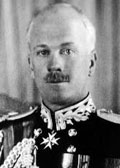 |
Vere Brabazon Ponsonby
b. 27 Oct 1880, London, England
d. 10 Mar 1956, Stansted, England |
| Title: |
Governor General and Commander-in-Chief of Canada = Gouverneur général et Commandant en chef du Canada |
| Term: |
4 Apr 1931 - 2 Nov 1935 |
| Chronology: |
20 Mar 1931,
appointed by Commission under the Royal Sign Manual and Signet [1] |
| |
4 Apr 1931, took an oath of allegiance and an oath of office as Governor-General and Commander-in-Chief of Canada, public ceremony, Red Chamber, Province House, Halifax, Nova Scotia [2] |
| |
2 Nov 1935,
appointment superseded by the Commission of a successor effective on taking the prescribed oaths [3] |
| Names/titles: |
Nobility title (by courtesy): Viscount Duncannon (1906-1920); nobility titles (succession, all titles in the peerage of Ireland): Earl of Bessborough (from 1 Dec 1920), Viscount Duncannon, of Duncannon Fort, Co. Wexford (from 1 Dec 1920), Baron Bessborough, of Bessborough, Co. Kilkenny (from 1 Dec 1920); nobility title (succession, in the peerage of UK): Baron Ponsonby, of Sysonby, Co. Leicester; Baron Duncannon, of Bessborough (UK) (from 1 Dec 1920); nobility title (conferred): Earl of Bessborough (UK) (from 2 Jun 1937) |
| Biography: |
| Eldest son of Viscount Duncannon (later 8th Earl of Bessborough); was educated at Harrow School; attended Trinity College, Cambridge (1898-1901); graduated with the bachelor of arts degree (1901); called to the Bar, Inner Temple (1903); served as a member of the London County Council (1907-1910) for East Marylebone; was returned to Parliament as Conservative MP for Cheltenham (1910), but lost his seat at the General Election held in the end of 1910; again elected MP for Dover (1913-1920); participated in World War I as a staff officer; commissioned second lieutenant in the Buckinghamshire Yeomanry (1914); earned temporary promotion to captain (1915); succeeded to the earldom in 1920; resigned from the House of Commons, being appointed Crown Steward and Bailiff of the Three Hundreds of Chiltern (1920); entered the House of Lords (1920-1956); pursued business career, heading the São Paulo Railway and the Margarine Union; served as deputy chairman of De Beers Consolidated Mines; sworn in as a member of the U.K. Privy Council (20 Mar 1931); appointed Governor-General and Commander-in-Chief of Canada (4 Apr 1931 - 2 Nov 1935); his term fell on the period of the Great Depression, which especially hard hit the Canadian economy; inaugurated the first trans-Canadian phone system (1932) and also saw the creation of the Canadian Broadcasting Corporation; being an enthusiastic amateur actor, he inaugurated the Dominion Drama Festival; after his term as Governor General ended, he returned to England and for a short time returned to his earlier business pursuits; during World War II, he helped establish a department within the Foreign Office that looked after the welfare of French refugees in Britain. |
| Biographical sources: The Canadian encyclopedia: year 2000 edition. McClelland & Stewart Inc., Toronto; The Times, No. 53,477, Royal Edition, London Monday March 12 1956, pp. 10, 14 (obituary). |
| |
| [1] |
The Canada Gazette, Vol. LXV, No. 10, Ottawa, Saturday, September 5, 1931, p. 607. |
| [2] |
The Canada Gazette, Extra, Ottawa, Saturday, April 4, 1931; The Globe, Vol. LXXXVIII, Number 25,356, Toronto, Monday, April 6, 1931, pp. 1-2. |
| [3] |
The Canada Gazette, Extra, Ottawa, Saturday, November 2, 1935; The Globe, Vol. XCII, Number 26,790, Toronto, Monday, November 4, 1935, pp. 1, 5. |
| |
Image: photograph (c. 1935) |

